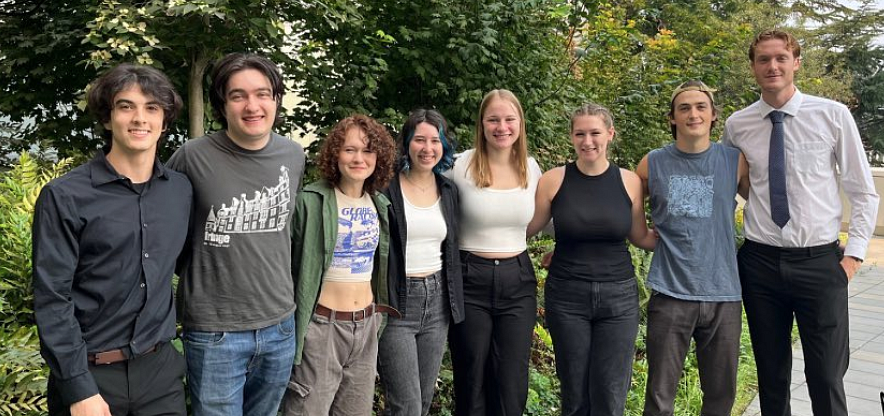
Roughly half the world's population is infected with the bacterium H. pylori, a leading cause of stomach cancer and ulcers. A group of undergraduates are working to create a probiotic capsule they hope could be a gamechanger.
The students are affiliated with the iGEM foundation, a non-profit organization dedicated to the advancement of synthetic biology, education and competition. Based in Assistant Professor Calin Plesa’s lab at Knight Campus, the team is funded by UO academic programs and departments, including the Knight Campus, the Lundquist College of Business and the Center for Undergraduate Research and Engagement (CURE).
The UO iGEM team is mentored by graduate students in the Plesa Lab, the Hettiaratchi Lab and the Hosseinzadeh Lab and co-led by Keane Deas and Oliver Loreto. Deas is a junior studying Biochemistry and Biology who works in Plesa Lab as part of the Knight Campus Undergraduate Scholars and Loreto is a Biochemistry major and a Bioengineering minor. Members of the team represent science disciplines from all over the UO campus, including several members in the Knight Campus Undergraduate Scholars program, as well as business students.
This year’s project seeks to create a living therapeutic in the form of a probiotic, similar to the bacteria found in yogurt. The team's goal is to engineer the probiotic strain to specifically target and treat infections in the gut, like H. pylori, which is resistant to current antibiotics.
“Our work has incredibly high-impact, both in our research itself and for all the members of the team,” Deas said. “There are a lot of applications within our ultimate goal, and we are trying to increase the modularity of our system to demonstrate that. Ideally, our system could be used to target any pathogen and exist as a strong antibiotic alternative.”
A unique aspect of iGEM is the chance for undergraduate students to collaborate with science students across disciplines while creating and executing a research project from scratch.
“iGEM requires that undergraduate students lead all the research in an iGEM team,” Loreto said. “This means that every one of the people on our team is directly contributing to the success of our research.”
Team members say the opportunity to gain leadership skills is a particularly beneficial part of the iGEM experience.
“For the team itself, it's a chance for us to design and carry out a project on our own,” said Deas. “Self-sufficiency in research is an incredibly valuable skill that few undergraduates have the opportunity to truly develop.”
This year’s team is raising money through DuckFunder to attend the iGEM 2023 Grand Jamboree in Paris, where teams from around the world gather to collaborate to advance the field of synthetic biology. The event, scheduled for Nov. 2-5, is expected to draw 5,000 attendees, representing more than 400 teams from 66 countries – each with projects that explore synthetic biology.
